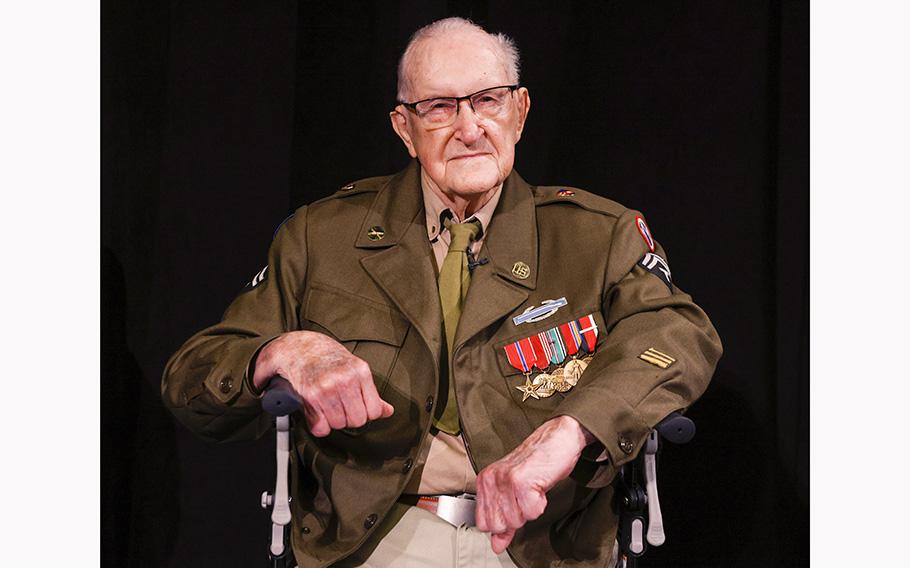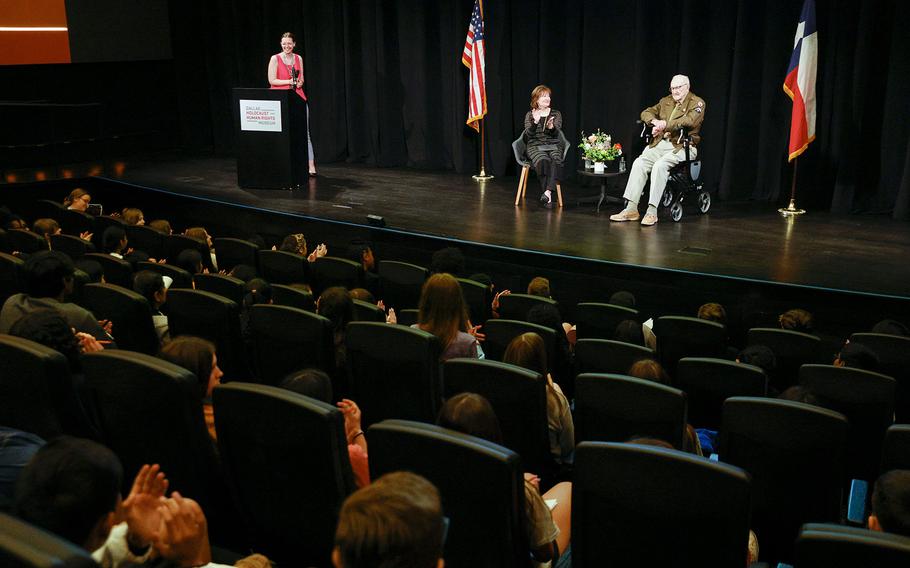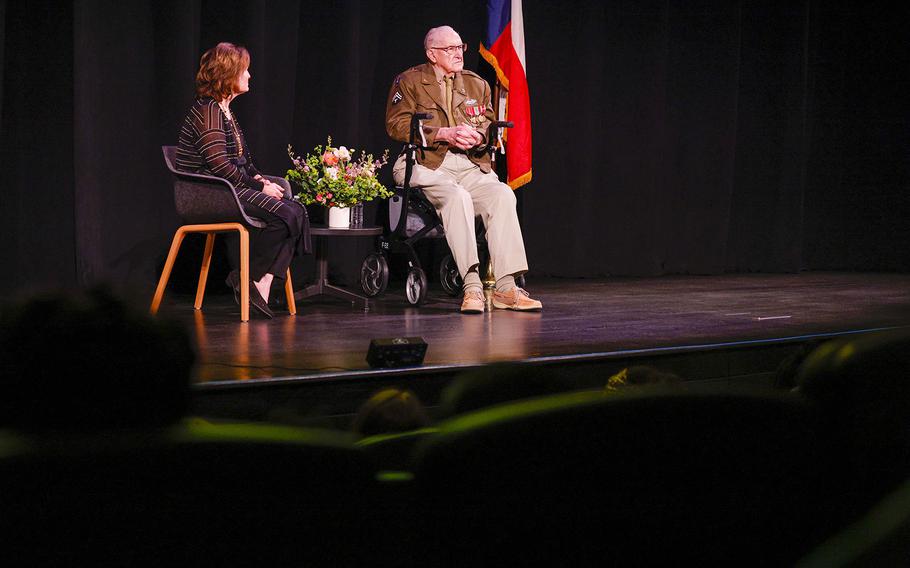
WIlliam Kongable sits on stage before a presentation to students at the Dallas Holocaust and Human Rights Museum in downtown Dallas, Thursday, May 4, 2023. Kongable, 98, was a member of the Army’s 89th Infantry Division during World War II and liberated Ohrdruf, a labor concentration camp in Germany. (Elías Valverde II, Dallas Morning News/TNS)
(Tribune News Service) — William Kongable, who was among the first U.S. troops to liberate a Nazi camp, doesn’t boast about his contributions during World War II — he says he doesn’t see his service to the country as some “great heroic effort.”
“I just happened to be there,” Kongable said. “That’s what most of the fellas felt like.”
In light of Victory in Europe Day on May 8, the 97-year-old WWII veteran spoke with North Texas students at the Dallas Holocaust and Human Rights Museum about his experience in Europe. He is one of about 167,000 Americans who served in the war and are still living today. Although he does not think himself a hero, Kongable wants to share his story so one of the most atrocious events in history does not repeat itself.
Member of Kongable’s division liberated the Ohrdruf camp, the first Nazi camp to be liberated by U.S. troops, according to the United States Holocaust Memorial Museum.
Kongable, born and raised in Oklahoma, lives in Friendswood near Houston. He remembers how patriotic Americans were after the attack on Pearl Harbor, and how many of the men he knew were eager to join the military.
“Besides girls and dancing, we were pretty patriotic,” Kongable said.
Kongable was drafted into the U.S. Army immediately following high school graduation. In less than a year, he would land in Le Havre, France.
“Going across, we didn’t know what we were going to get into,” Kongable said. “Everybody was a little apprehensive I guess, but when you’re 18, you’re bulletproof. Nothing’s ever going to happen to you; you’re never going to get shot.”
‘All hell broke loose’
Kongable doesn’t remember the specific day in March 1945 when he and the other soldiers in his company learned they would be crossing the Rhine River early in the morning.
The first company crossed the river with no incident, Kongable said.
“When the second company started to cross, all hell broke loose,” he said.

Students applaud after WIlliam “Bill” Kongable spoke during a presentation alongside moderator Fran Berg at the Dallas Holocaust and Human Rights Museum in downtown Dallas, Thursday, May 4, 2023. (Elías Valverde II, Dallas Morning News/TNS)
Two separate groups of German soldiers had set up anti-aircraft guns at culverts on the road next to the river. They fired upon the U.S. soldiers in a “perfect criss-cross pattern,” Kongable said.
U.S. soldiers, including Kongable, were on a bluff overlooking the river. They returned fire and tried to provide cover for those trying to cross the river.
Although Allied forces were able to push through the German ambush, many U.S. soldiers’ lost their lives, Kongable said.
“I’m not sure how many of them got across the river; it’s amazing if any of them did,” he added.
The encounter was the most intense combat Kongable saw in Europe, he said. What his division witnessed in the following months shocked the world.
‘What they left behind’
In April 1945, a patrol from Kongable’s company came across the Ohrdruf camp. They did not run into any resistance trying to enter the camp, because the guards had abandoned it, Kongable said.
Earlier that same month, the Schutzstaffel led all of the prisoners on a “death march” to the Buchenwald concentration camp, according the the U.S. Holocaust Memorial Museum.
What was left behind was “evidence of Nazi cruelty,” Kongable said.

WIlliam “Bill” Kongable speaks during a presentation to students alongside moderator Fran Berg at the Dallas Holocaust and Human Rights Museum in downtown Dallas, Thursday, May 4, 2023. (Elías Valverde II, Dallas Morning News/TNS)
Kongable retold stories he heard from soldiers who first walked through the camp — bodies of about 50 men who had been shot in the head were left at the main gate. In a different part of the camp, a building held the “skin-and-bone” bodies of prisoners “stacked like logs in a woodshed,” he recalled.
The worst part, Kongable said, was a “long, open pit” outside the camp, where thousands of bodies were estimated to have been buried.
“They were all horrified like everybody else,” Kongable said.
General Dwight D. Eisenhower is credited as saying he made the visit to Ohrdruf “deliberately, in order to be in a position to give first-hand evidence of these things if ever, in the future, there develops a tendency to charge these allegations merely to ‘propaganda.’”
Important history
The discovery of Ohrdruf and other concentration camps enlightened the public about the horrors of the Holocaust under Nazi Germany, but Kongable wants to make sure that newer generations do not forget what can happen under dictatorships.
A 2020 report by Pew Research showed that less than half of U.S. adults can correctly answer questions related to what occurred during the Holocaust, including the number of Jews who were systematically murdered. The Anti-Defamation League in March reported a 36% year-to-year increase in reports of antisemitic incidents in 2021.
Kongable said he was disturbed by events like the Jan. 6 insurrection at the U.S. Capitol, and he’s “worried about some of the movements that are afoot” in the country.
Americans need to know their history and be engaged in the democratic process to prevent the country from going down the wrong path, Kongable said.
“There are people in the U.S. who want to do the same thing,” he said. “They want to establish a dictatorship with a single party dictating suppressing all opposition and the holocaust could happen here if we let it happen.”
©2023 The Dallas Morning News.
Visit dallasnews.com.
Distributed by Tribune Content Agency, LLC.